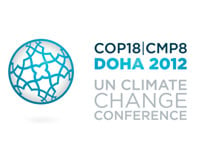
Top stories






More news















Molewa delivered South Africa's country statement a day before the end of the United Nations Climate Change Conference, COP18, where she told delegates that the Doha talks must find a global solution to the climate change crisis that severely impacts all countries.
"We must secure the multilateral rules-based climate change system to guide urgent and adequate implementation of climate action starting from 1 January 2013 up to 2020; and we must define the process for negotiating the further development of this system for the period beyond 2020," said Molewa.
It is widely expected that COP18 will likely confirm the design of a 2nd Commitment Period of the Kyoto Protocol, put an end to some work streams and work towards a new international legally binding agreement in 2015.
Under the Kyoto Protocol, parties must adopt the 2nd Commitment Period through amendments to its Annex B, and ensure that there is no legal or operational gap between the 1st and 2nd Commitment Periods; ensure that the 2nd Commitment Period has environmental integrity and the necessary levels of mitigation ambition in line with the science.
Parties must also ensure that there is a mechanism to intensify ambition during the 2nd Commitment and limit the erosion of ambition through carry-over of surplus Kyoto assigned amount units.
"Parties must work under the [United Nations Framework Convention on Climate Change] and must close the work under the Bali Action Plan having meaningfully concluded the mandated work, and we need to fully implement climate action that is enabled, supported and guided by the new post 2012 arrangements," said Molewa.
These arrangements are the Adaptation Committee, Technology Executive Committee, Finance Standing Committee, Green Climate Fund, the Nationally Appropriate Mitigation Actions (NAMA) registry and transparency arrangements.
Parties meeting here in Doha have 36 hours to iron-out some key issues around finance and mitigation. Finance will enable adaptation and mitigation action by developing countries.
The climate talks in Doha must find ways of addressing the finance gap between 2013 and 2020, provide confidence and give direction on long-term sources of finance and find ways of making the Green Climate Fund fully functional.
"On the issue of mitigation, the Doha talks must agree to a process to ensure comparability of effort between countries taking a Kyoto 2nd Commitment Period and developed countries not willing to do so, through establishing quantified economy wide emission reduction pathways," said Molewa.
Further, Doha must ensure that there is an alignment of the ambition of these mitigation commitments with the 2013-2015 review, and ensure that the implementation arrangements of the post 2012 system develop technical and political solutions to issues that may not be concluded and require on-going work, such as, the questions of equitable access to sustainable development, intellectual property rights and unilateral trade measures.
There are two work-streams under the Durban Platform on Enhanced Action; the one is raising ambition in the pre-2020 period to close the ambition lag, and the other is to develop a new legally binding agreement under the Convention that will apply to all Parties.
"This instrument (agreement) should reinforce a fair, multilateral, rules-based regime that will give effect to the principles of the Convention, and the right to equitable access to sustainable development," said Molewa.
The minister also said that the agreement must balance mitigation and adaptation, and ensure the provision of finance, technology and capacity building to allow developing countries to move to lower carbon and climate resilient economies.
According the World Bank Report, the world is headed to a 4 degrees Celsius increase in temperature by the end of the century if nothing is done about climate change.
There is general hope that these climate talks will help the world avoid the economic and social effects of climate change.
"We must ensure that Doha delivers on meaningful actions between 2013 and 2020, and establishes a solid base to drive up the mitigation ambition so that by the time the new legal instrument comes into effect, we still have a fair chance of preventing dangerous anthropogenic interference with the climate system," said Molewa.
SAnews.gov.za is a South African government news service, published by the Government Communication and Information System (GCIS). SAnews.gov.za (formerly BuaNews) was established to provide quick and easy access to articles and feature stories aimed at keeping the public informed about the implementation of government mandates.
Go to: http://www.sanews.gov.za